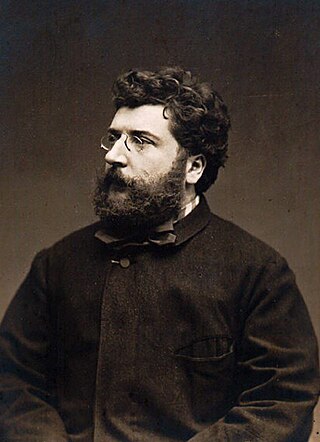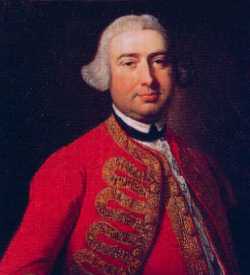Related Research Articles

George FridericHandel was a German-British Baroque composer well known for his operas, oratorios, anthems, concerti grossi, and organ concertos. Handel received his training in Halle and worked as a composer in Hamburg and Italy before settling in London in 1712, where he spent the bulk of his career and became a naturalised British subject in 1727. He was strongly influenced both by the middle-German polyphonic choral tradition and by composers of the Italian Baroque. In turn, Handel's music forms one of the peaks of the "high baroque" style, bringing Italian opera to its highest development, creating the genres of English oratorio and organ concerto, and introducing a new style into English church music. He is consistently recognized as one of the greatest composers of his age.

Carmen is an opera in four acts by the French composer Georges Bizet. The libretto was written by Henri Meilhac and Ludovic Halévy, based on the novella of the same title by Prosper Mérimée. The opera was first performed by the Opéra-Comique in Paris on 3 March 1875, where its breaking of conventions shocked and scandalised its first audiences. Bizet died suddenly after the 33rd performance, unaware that the work would achieve international acclaim within the following ten years. Carmen has since become one of the most popular and frequently performed operas in the classical canon; the "Habanera" and "Seguidilla" from act 1 and the "Toreador Song" from act 2 are among the best known of all operatic arias.
Overture is a music instrumental introduction to a ballet, opera, or oratorio in the 17th century. During the early Romantic era, composers such as Beethoven and Mendelssohn composed overtures which were independent, self-existing, instrumental, programmatic works that foreshadowed genres such as the symphonic poem. These were "at first undoubtedly intended to be played at the head of a programme".

Georges Bizet was a French composer of the Romantic era. Best known for his operas in a career cut short by his early death, Bizet achieved few successes before his final work, Carmen, which has become one of the most popular and frequently performed works in the entire opera repertoire.

Rinaldo is an opera by George Frideric Handel, composed in 1711, and was the first Italian language opera written specifically for the London stage. The libretto was prepared by Giacomo Rossi from a scenario provided by Aaron Hill, and the work was first performed at the Queen's Theatre in London's Haymarket on 24 February 1711. The story of love, war and redemption, set at the time of the First Crusade, is loosely based on Torquato Tasso's epic poem Gerusalemme liberata, and its staging involved many original and vivid effects. It was a great success with the public, despite negative reactions from literary critics hostile to the contemporary trend towards Italian entertainment in English theatres.

Samson is a three-act oratorio by George Frideric Handel, considered to be one of his finest dramatic works. It is usually performed as an oratorio in concert form, but on occasions has also been staged as an opera. The well-known arias "Let the bright Seraphim", "Total eclipse" and "Let their celestial concerts" are often performed separately in concert.

Agrippina is an opera seria in three acts by George Frideric Handel with a libretto by Cardinal Vincenzo Grimani. Composed for the 1709–10 Venice Carnevale season, the opera tells the story of Agrippina, the mother of Nero, as she plots the downfall of the Roman Emperor Claudius and the installation of her son as emperor. Grimani's libretto, considered one of the best that Handel set, is an "anti-heroic satirical comedy", full of topical political allusions. Some analysts believe that it reflects Grimani's political and diplomatic rivalry with Pope Clement XI.

Riccardo primo, re d'Inghilterra is an opera seria in three acts written by George Frideric Handel for the Royal Academy of Music (1719). The Italian-language libretto was by Paolo Antonio Rolli, after Francesco Briani's Isacio tiranno, set by Antonio Lotti in 1710. Handel wrote the work for the Royal Academy's 1726–27 opera season, and also as homage to the newly crowned George II and the nation where Handel had just received citizenship.

Scipione, also called Publio Cornelio Scipione, is an opera seria in three acts, with music composed by George Frideric Handel for the Royal Academy of Music in 1726. The librettist was Paolo Antonio Rolli. Handel composed Scipione whilst in the middle of writing Alessandro. It is based on the life of the Roman general Scipio Africanus. Its slow march is the regimental march of the Grenadier Guards and is known for being played at London Metropolitan Police passing out ceremonies.

Orlando is an opera seria in three acts by George Frideric Handel written for the King's Theatre in London in 1733. The Italian libretto was adapted from Carlo Sigismondo Capece's L'Orlando after Ludovico Ariosto's Orlando Furioso, which was also the source of Handel's operas Alcina and Ariodante. More an artistic than a popular success at its first performances, Orlando is today recognised as a masterpiece.

Giustino is an opera seria in three acts by George Frideric Handel. The opera was first given at the Covent Garden Theatre in London on 16 February 1737. The Italian-language libretto was adapted from Charles VI's court poet Pietro Pariati's libretto for Giustino (1711), after the much older original libretto of Nicolò Beregan (1682). The libretto had already been adapted by many composers including Vivaldi's Giustino of 1724 and Tomaso Albinoni's lost opera of 1711.

Sosarme, re di Media is an opera by George Frideric Handel written in 1732 for the King's Theatre in the Haymarket, London, where it ran for 12 performances. The text was based on an earlier libretto by Antonio Salvi, Dionisio, Re di Portogallo, and adapted by an unknown writer. The original setting of Portugal was changed to Sardis in Lydia.

Acis and Galatea is a musical work by George Frideric Handel with an English text by John Gay. The work has been variously described as a serenata, a masque, a pastoral or pastoral opera, a "little opera", an entertainment and by the New Grove Dictionary of Music as an oratorio. The work was originally devised as a one-act masque which premiered in 1718.

Floridante is an opera seria in three acts by George Frideric Handel. The Italian-language libretto was by Paolo Antonio Rolli after Francesco Silvani's libretto for Marc'Antonio Ziani dramma per musica La costanza in trionfo of 1696.

Joshua is an oratorio by George Frideric Handel. It was composed in a month, from 19 July 1747 to 19 August 1747, six months before the beginning of the oratorio season. Joshua is Handel's fourth oratorio based on a libretto by Thomas Morell. The oratorio premiered on 9 March 1748 at the Covent Garden Theatre, London. Joshua is based on the Biblical story of Joshua as the leader of the ancient Israelites. The story follows the Israelites from their passage over the Jordan River into Caanan and through the Battle of Jericho. The work also includes a love story elaborated from a few hints in the Biblical narrative between Caleb's daughter Achsah and Othniel, a young soldier.

Between 1858 and 1902, the Händel-Gesellschaft produced a collected 105-volume edition of the works of George Frideric Handel. Even though the collection was initiated by the society, many of the volumes were published by Friedrich Chrysander working alone. The wording on the title page of the volumes is "Georg Friedrich Händel's Werke. Ausgabe der Deutschen Händelgesellschaft" which translates as "Georg Friedrich Handel's works. Edition of the German Handel Society". Chrysander's work has been criticised, however the scale of his achievement is also praised. The collection's abbreviation of "HG" can be used to identify individual works by Handel; for example Handel's Messiah can be referred to as "HG xlv". For practical use, the HG system has been superseded by the HWV numbering system. The 105 volumes do not contain the complete works of Handel—with at least 250 of his works unpublished in the collection.

John Beard was an English tenor of the 18th century. He is best remembered for creating an extensive number of roles in the operas and oratorios of George Frideric Handel.

The Royal Academy of Music was a company founded in February 1719, during George Frideric Handel's residence at Cannons, by a group of aristocrats to secure themselves a constant supply of opera seria. It is not connected to the London conservatoire with the same name, which was founded in 1822.
Isabella Girardeau was an Italian operatic soprano who flourished in London, England from 1709 to 1712. Commonly referred to by the opera going public in London as "La Isabella", she is best remembered today for creating the role of Almirena in the momentous premiere of George Frideric Handel's Rinaldo on 24 February 1711 at the Queen's Theatre in the Haymarket in which she introduced the famous aria "Lascia ch'io pianga". She had succeeded Joanna Maria Lindelheim, "The Baroness", as one of the leading sopranos at that theatre. She is said to have had a bitter rivalry with the Queen's other prima donna, the soprano Elisabetta Pilotti-Schiavonetti.

Les pêcheurs de perles is an opera in three acts by the French composer Georges Bizet, to a libretto by Eugène Cormon and Michel Carré. It was premiered on 30 September 1863 at the Théâtre Lyrique in Paris, and was given 18 performances in its initial run. Set in ancient times on the island of Ceylon, the opera tells the story of how two men's vow of eternal friendship is threatened by their love for the same woman, whose own dilemma is the conflict between secular love and her sacred oath as a priestess. The friendship duet "Au fond du temple saint", generally known as "The Pearl Fishers Duet", is one of the best-known in Western opera.
References
- Stanley Sadie: "Dean, Winton", Grove Music Online ed L. Macy (Accessed 11 December 2006), grovemusic.com, subscription access.
- Winton Dean's obituary